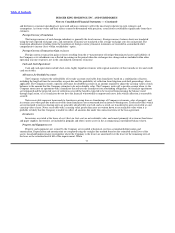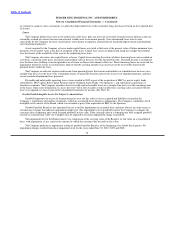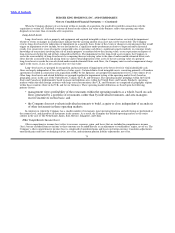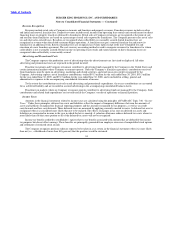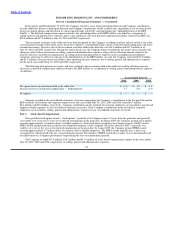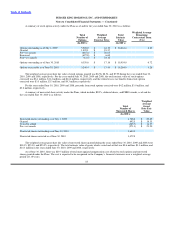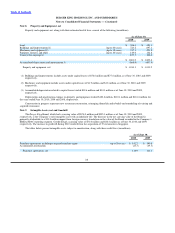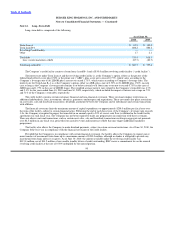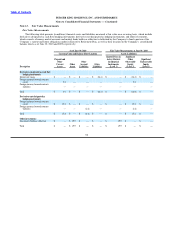Burger King 2010 Annual Report Download - page 86
Download and view the complete annual report
Please find page 86 of the 2010 Burger King annual report below. You can navigate through the pages in the report by either clicking on the pages listed below, or by using the keyword search tool below to find specific information within the annual report.
Table of Contents
BURGER KING HOLDINGS, INC. AND SUBSIDIARIES
Notes to Consolidated Financial Statements — (Continued)
In the quarter ended September 30, 2009, the Company elected to cease future participant deferrals and Company contributions
into the rabbi trust; however, participant deferrals and Company contributions will be credited with a hypothetical rate of return based
on the investment options and allocations in various mutual funds selected by each participant (the “unfunded portion of the ERP
liability”). The deferred compensation expense related to the unfunded portion of the ERP liability is included as a component of
selling, general and administrative expenses and was not significant. The total deferred compensation liability related to the ERP was
$22.6 million and $17.9 million at June 30, 2010 and 2009, respectively.
The investment securities in the rabbi trust have been designated by the Company as trading securities and are carried at fair value
as restricted investments within other assets, net in the Company’s consolidated balance sheets, with unrealized trading gains and losses
recorded in earnings. The fair value of the investment securities held in the rabbi trust was $19.9 million and $17.9 million as of
June 30, 2010 and 2009, respectively. During the current fiscal year, the Company began recording the net (gains) losses related to the
change in value of these investments in selling, general and administrative expenses, along with an offsetting amount related to the
increase (decrease) in deferred compensation, in selling, general and administrative expenses in the accompanying consolidated
statements of income to reflect its exposure to the funded portion of the ERP liability. As such, the Company reclassified $3.9 million
and $1.5 million of loss previously recorded in other operating (income) expenses, net to selling, general and administrative expenses
for the fiscal years ended June 30, 2009 and 2008, respectively.
The following table presents net (gains) and losses related to the investments held in the rabbi trust and the offsetting increase
(decrease) in deferred compensation expense related to the ERP liability as a component of selling, general and administrative expenses
(in millions):
Years Ended June 30,
2010 2009 2008
Net (gains) losses on investments held in the rabbi trust $ (3.7) $ 3.9 $ 1.5
Increase (decrease) in deferred compensation — funded portion 3.7 (3.9) (1.5)
Net impact $ — $ — $ —
Amounts recorded in the consolidated statements of income representing the Company’s contributions to the Savings Plan and the
ERP on behalf of restaurant and corporate employees for the years ended June 30, 2010, 2009 and 2008 totaled $6.7 million,
$6.4 million and $6.9 million, respectively. Company contributions made on behalf of restaurant employees are classified as payroll and
employee benefit expenses in our consolidated statements of income, while Company contributions made on behalf of corporate
employees are classified as selling, general and administrative expenses in our consolidated statements of income.
Note 3. Stock−based Compensation
Non−qualified stock option awards (“stock options”) granted by the Company expire 10 years from the grant date and generally
vest ratably over a four to five−year service period commencing on the grant date. In August 2009, the Company granted stock options
covering approximately 1.8 million shares to eligible employees. Nonvested shares granted by the Company consist of RSU awards,
PBRS awards and deferred shares issued to non−employee members of the Company’s Board of Directors. RSU’s generally vest
ratably over a two to five year service period commencing on the grant date. In August 2009, the Company granted PBRS awards
covering approximately 0.7 million shares of common stock to eligible employees. The PBRS awards typically have a three year
vesting period, which includes the one−year performance period. The number of PBRS awards that actually vest are determined based
on achievement of a Company performance target during the one−year performance period.
The Company recorded $17.0 million, $16.2 million and $11.4 million of stock−based compensation expense in the years ended
June 30, 2010, 2009 and 2008, respectively, in selling, general and administrative expenses.
83






